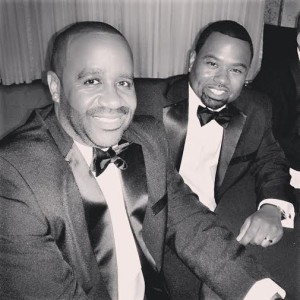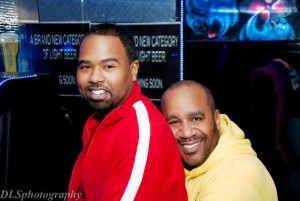 Born and raised in Atlanta, Georgia, Cas Carr works as a networks consultant and lives with his husband Jerome of three and a half years.
Born and raised in Atlanta, Georgia, Cas Carr works as a networks consultant and lives with his husband Jerome of three and a half years.
But while Cas loves his hometown, he’s grown increasingly concerned with new proposed legislation that seeks to put an individual or businesses’ religious beliefs above the common good.
“I’m opposed to this bill, I’m not supporting it in any shape, form or fashion,” states Cas matter-of-factly.
The proposed legislation is the so-called Religious Freedom Restoration Act or RFRA, which if passed, could allow an individual and businesses to use their religious beliefs as a justification to discriminate against people. As a black gay man, this is of particular concern to Cas who knows all too well that this bill could be used and abused to violate our most basic, fundamental rights.
“What it does is it takes away from a lot of human rights and it could be used to discriminate. We should all have the right to choose what we believe, that’s why we have the bill of rights. But having that bill in place, it takes some of those rights away.”
Cas, who is a man of faith and grew up in the Baptist tradition, holds sacred that faith is something from within, and that no one should force their religious views on another, especially in the workplace.
 “When it comes to religion, religion is an individual belief. I can only speak in terms of myself and what I want for me, but I don’t think that this bill should dictate my future or my faith.”
“When it comes to religion, religion is an individual belief. I can only speak in terms of myself and what I want for me, but I don’t think that this bill should dictate my future or my faith.”
Beyond that, Cas argues that Georgians should be judged on their ability to do their jobs—not on who they are or whom they love.
“I don’t feel that it’s fair across the board because if you have a qualified individual that applies for a job, for someone to say ‘oh you’re gay, you can’t have that job,’ that person could have all of the talent in the world, but based on their sexual orientation, they are discriminated against. I don’t think that’s fair.”
Cas adds, “My personal life is just that, it’s my personal life. And as long as I’m not affecting anyone around me, I say live and let live.”
And so long as state law fails to protect gay and transgender Georgians from discrimination in the workplace and in housing, Cas worries that the RFRA bill would only subject LGBT people to heightened levels of discrimination.
“If the bill is passed, things are going to be limited, you’re going to be scrutinized, subject to ridicule, ostracized, cast out.”
And it won’t just be the LGBT community who will be harmed by this legislation. Cas argues the economy overall will be impacted negatively as such discriminatory legislation would tarnish Georgia’s brand as a fair and welcoming place to do business.
“From an economic perspective, there’s a lot of money from the LGBT community. If something like that happened here, you think in terms of relocation, people trying to find jobs elsewhere. So of course it would be a major hit on the economy.”
But there’s no reason to oppose this harmful and dangerous piece of legislation more compelling than the fact that it will erode our most fundamental right of all—that as Georgians, we all should treat our neighbors as we would like to be treated.
“I wouldn’t feel like I had equal rights as a citizen… If this bill passes, I feel that a lot of freedoms would be given up. We’ve come so far, at the same time this bill would be a major step backwards for society.”
SHARE THIS STORY


 @GeorgiaUnites
@GeorgiaUnites